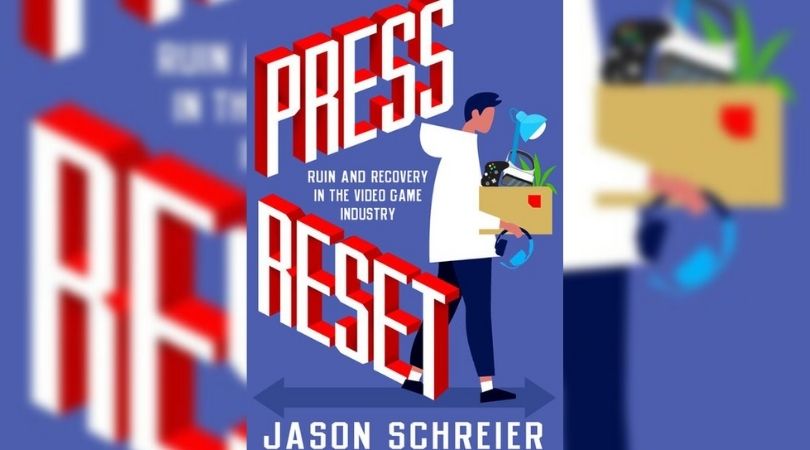
Press Reset: Ruin and Recovery in the Video Game Industry is an upcoming book by Jason Schreier, published by Grand Central Publishing, centered around the downfall of development studios. For anyone keeping an eye on the gaming industry, Schreier is a well-known name, covering sensitive topics like studio closures and development crunch in lengthy exposés for Bloomberg News. Like his regular reporting, Press Reset cements itself as a must-read, detailing the history of specific studio closures and discussing potential solutions to an issue that so often plagues a multibillion-dollar industry.
Each chapter of Press Reset focuses on a specific development studio, telling the story of how that studio was shut down, usually because of disagreements from higher-ups or tension with the publishing company, in the face of renowned success from players and fans. Schreier uses examples that will hit close to home for almost anyone who’s been involved in video games over the past 20 years too, including Irrational Games (Bioshock, System Shock 2) and Big Huge Games (Kingdoms of Amalur: Reckoning).
However, what stands out about Press Reset is its emphasis on people. While Press Reset is a worthwhile read for one interested in gaming history, it’s not a history book – it’s a book about people and the struggles that developers face in a tumultuous industry full of layoffs and studio closures. Although each chapter tells the tale of a specific studio, it’s done by following the career of its developers, typically the studio founders or other employees.
In addition, Press Reset is an enlightening look at how the internal side of the gaming industry functions for those watching closures unfold from outside the studio walls, especially the relationship between development studios and publishing companies. One of the most interesting stories in Press Reset is of 38 Studios, which readers may remember as baseball star Curt Schilling’s venture into video games, which caused political controversy outside of the gaming industry for defaulting on a $1.125 million loan payment to the state of Rhode Island. In this chapter, as well as others throughout the book, Schreier does a phenomenal job at outlining the importance of competent management and how poor decisions can dramatically affect employees, who often uproot their lives to move across the company for development jobs. The amount of information that Schreier can convey to readers is legitimately impressive, indicating hours of in-depth interviews with a myriad of game developers and others within the industry.
Press Reset doesn’t only focus on the unfortunate downfall of AAA game studios, though. There are quite a few chapters that speak on independent development, a route often taken by developers sick of being laid off and constantly moving around the world, only to have a job for a handful of years before being uprooted once again. The stark contrast of indie development and AAA studios is interesting to delve into, even as a third-party reading about it in a book. Of course, going indie isn’t a walk in the park either (game development rarely, if ever, is, which is made especially clear in Press Reset), and Schreier does a great job of comparing the differences between AAA and indie development studios, and how each has its own unique challenges.
Unfortunately, not everything about Press Reset is a slam dunk. Toward the end, Schreier, along with developers he’s spoken to throughout the book, attempts to tackle one of the biggest questions plaguing the games industry: How do we fix instability? For such a strong, researched, and well-executed deep dive into the subject of studio closures, it’s disappointing to see Press Reset flounder in the final chapter because, simply put, there’s not a good answer.
While it’s definitely not Schreier’s fault that he was unable to come up with a good, concise solution to a decades-long problem, the book’s pacing feels abruptly interrupted toward the end. It switches from an informative exposé on how the industry functions to a short, hypothetical query on how to fix a problem that is much larger than one journalist and five or six developers. It is interesting to see the developers’ suggestion, especially because there is disagreement about how to approach a solution, but the ending of Press Reset rings hollow compared with the incredibly thorough reporting that comes prior.
However, overall, Press Reset is a book that can’t be recommended enough for anyone interested in the games industry, no matter their role. Full of enlightening stories with details and statements from those involved and affected the most by studio closures, Press Reset is both a look at the business of games and the inhumane treatment of developers trying to make a living doing what they love, all for the benefit of an entertainment industry that often leaves them behind.
Press Reset: Ruin and Recovery in the Video Game Industry is available on May 11.
Press Reset: Ruin and Recovery in the Video Game
TL;DR
However, overall, Press Reset is a book that can’t be recommended enough for anyone interested in the games industry, no matter their role. Full of enlightening stories with details and statements from those involved and affected the most by studio closures, Press Reset is both a look at the business of games and the inhumane treatment of developers trying to make a living doing what they love, all for the benefit of an entertainment industry that often leaves them behind.






